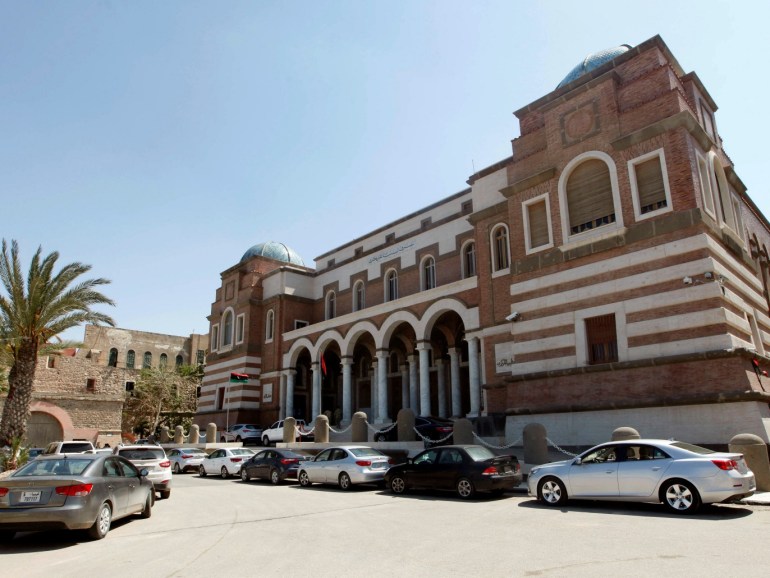Retired Libyan Major General Khalifa Haftar confirmed the opening of oil fields and ports under the control of his forces, after failing to impose his previous conditions for re-pumping Libyan oil and losing the war in the capital, Tripoli.
Last July, Haftar's forces announced several conditions for reopening the oil facilities, including depositing oil money in a foreign country, setting up a transparent spending mechanism with international guarantees, and auditing the accounts of the Central Bank of Libya in Tripoli to find out the path of the funds that have been spent over the past years.
Naji al-Maghribi, head of Haftar’s Petroleum Facilities Guard, announced in a video clip that re-exporting oil comes with a decision by Haftar to export the storage in oil port tanks.
Al-Maghrabi pointed out that limited exports are allowed through the oil ports to free storage space and enable the production of fuel for the electricity company’s stations.
Haftar closed the oil ports and fields last January because of the internationally recognized Government of National Accord managing oil revenues through the Central Bank of Libya in Tripoli.
The National Oil Corporation said on August 12 that the total losses of closing ports and oil fields amounted to about 8 billion and 221 million dollars, after 208 days of being closed by Haftar's forces.
Oil in Libya constitutes about 94% of the country's resources, where oil was first discovered in 1958.
Open the oil fields
Member of the Supreme Council of the State, Amna Mutair, confirmed that oil revenues will enter the accounts of the Central Bank of Libya in Tripoli, which is the only internationally recognized authority to manage Libya's external funds from oil.
Mutair added, "No state or company that has oil purchase contracts with Libya can bypass it to parallel institutions or expose it to legal suspicion that will be held accountable."
Mutair told Al-Jazeera Net that the official authorities in Tripoli welcome the move to open oil ports and fields, provided that everyone who caused the suspension of oil exports and exposed Libya to heavy losses exceeding $ 8 billion be held accountable.
She added that the opening of oil comes as a result of international pressure, and the internal tension does not bother Haftar much because he came to Libya to grind the Libyan citizen and increase his crises, at a time when the oil closure caused other repercussions, including the lack of liquidity in banks, the rise in the price of the dollar against the Libyan dinar and the increase in market prices. In addition to the shortage of gas supplies used to generate electricity.
In turn, a member of the House of Representatives in Tobruk, Ziyad Daghim, affirmed that the opening of oil ports and fields is partly related to extending gas stations to the Electricity Company to generate electricity.
Daghim told Al-Jazeera Net, "It is expected to reach a complete opening in accordance with the American vision and the guarantee of its implementation from the Libyan parties." Daghim stated that the current dispute is over the management of the oil corporation "in terms of its legal headquarters in Benghazi, its illegal council and its unprofessional political behavior."
Exclusive control of oil
Political analyst Abdullah al-Kabir believes that overseeing the oil sector in all its details is exclusive to the internationally recognized National Oil Corporation in Tripoli.
"The United States has been pressing its allies for weeks to re-pump oil, and Haftar wants to use the card to threaten to close and open oil politically after losing it militarily," al-Kabir said.
In a statement to Al-Jazeera Net, Al-Kabeer considered that oil revenues may be subject to new mechanisms, including transparency in the distribution of revenues present in all recent international statements.
He stated that the state of discontent and tension has reached an unprecedented level in Haftar's areas of influence, indicating that if the electricity crisis is resolved and the oil is closed again, this means the failure of the American efforts and the approaching military escalation option.
For his part, economic analyst Wahid al-Jabo said that the current supervisor of production, maintenance and export operations is the Oil Corporation in Tripoli and its subsidiary companies, and oil revenues will go to the Central Bank of Libya in Tripoli.
"International negotiations are expected to continue to review the accounts of the Central Bank of Libya in Tripoli and its parallel counterpart in eastern Libya until an agreement is reached on oil revenues," al-Jabo added to Al-Jazeera Net.
He believes that the indicators of the collapse of the Libyan economy have become clear if everyone does not rectify the situation to gradually re-pump oil and ensure that it is not closed again by any party, because this will have direct negative repercussions on the Libyan citizens.

